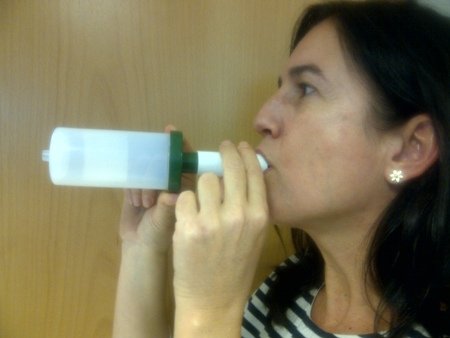The Interreg project Medisen is developing novel biosensors that have the capacity to detect lung cancer in a person’s exhaled breath. Tecnalia, the University of Perpignan and the Instituto de Tecnologías Químicas Emergentes de La Rioja (Inter-Química) are participating in this project.
 Interreg Medisen
Interreg Medisen
Lung and stomach cancer and liver diseases have symptoms similar to routine disorders and are hence difficult to diagnose. In the Interreg project Medisen, the researchers are endeavoring to create biosensors for detecting lung cancer tumor markers in the exhaled breath of patients.
In an ill person, the changes that occur in the affected organisms lead to changes in the exhaled breath. The human breath consists of numerous organic compounds, including acetone, butanol, methanol and hydrocarbons. A single specific component in the breath cannot be considered as a marker for lung cancer diagnosis. Rather, a combination of different compounds has to be observed. In sick patients, these compounds increase by 10 to 100 times from 1-20 ppb.
At the Institute of Onco-Haemathology of the Donostia Hospital, lung cancer patients took part in this study. The Instituto Biodonostia has been granted authorization for conducting clinical trials by the Ethic Committee of the Clinical Research of Euskadi.
Breath samples of patients were collected with a breath collecting device. The compounds that are needed to act as biomarkers were selected. The researchers then used gas chromatograph/mass spectrometry to analyze the organic compounds. Structural, statistical algorithms were then used for differentiating between cancerous and healthy patterns. These provided information for the sensor design.
Tecnalia is developing new materials for compound detection to increase the device sensitivity. The University of Perpignan is performing the testing of the novel materials, while Inter-Química is designing the device for sensing.